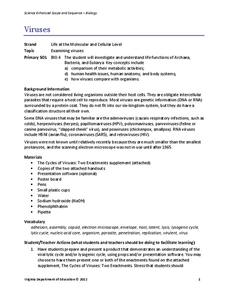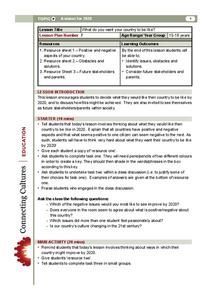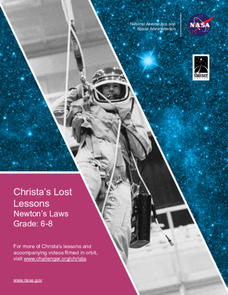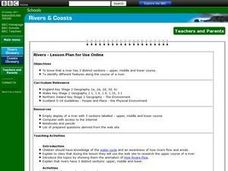Smithsonian Institution
Changing Gender Roles on the Home Front
Many historians discuss how gender roles changed because of World War II, but how did this come to be? An informative resource challenges scholars to do some digging and research the information for themselves. They research how...
Virginia Department of Education
Viruses
Germs, parasites, and viruses, oh my! Facilitate a lesson on viruses as individuals explore functions of Archaea, Bacteria, and Eukarya. They learn how viruses compare with other organisms in nature and how they contribute to health...
iCivics
Tribal Government: High School
Did you know there are 567 federally recognized American Indian and Native Alaskan tribes and villages in the United States alone? The resource helps break down the complexities of many different tribal societies to explain the concept...
Consortium for Ocean Science Exploration and Engagement (COSEE)
Carbon Dioxide & Krill: Impacts
What effects do temperature and carbon dioxide levels have on the zooplankton of Antarctica? This concluding lesson plan in a short unit on climate change and the ocean helps environmental scientists answer these questions. After...
PBS
Cardboard History
A PBS clip focused on collecting sports memorabilia launches this research project instructional activity. Class members then read Dan Gutman’s Honus and Me in which Wagner’s baseball card is used to time travel. The instructional...
Teach Engineering
Design Step 2: Research the Problem
How do you get started designing a product to meet your engineering design goals? Here, learners gain understanding of an important aspect of the engineering design process: background research. Through brainstorming and worksheets,...
University of the Desert
What Do You Want Your Country to be Like?
How would you like your country to be by 2020? What issues do you feel are most important, and how do those compare with your peers? Learners tackle questions regarding the evolving national and global culture of the twenty-first century...
Channel Islands Film
Sa Hi Pa Ca (Once Upon a Time): Lesson Plan 2
What tools do archaeologists and anthropologist use to learned about what life was like in the past. After watching West of The West's documentary Once Upon a Time that details how scientists use artifacts to establish a history of the...
Rainforest Alliance
How Do Jaguars and Howler Monkeys in Belize Depend on Us?
How does weather play a role in the lives of land and sea creatures? Find out with a instructional activity focused on habitats and the ways animals from different homes are connected. Here, learners explore how the life of a jaguar and...
Serendip
How Do Muscles Get the Energy They Need for Athletic Activity?
Every muscle movement requires energy, but where does that energy come from? Scholars answer this question and more as they complete a worksheet. By following the directions, completing research, and discussing it as a class, they begin...
NASA
Christa's Lost Lesson: Newton’s Laws
How do the laws of motion work in space? Learners explore Newton's laws of motion in different experiments as part of the Christa's Lost Lessons series. They rotate around the room in three stations to experience each law in action using...
Channel Islands Film
First Contact: Lesson Plan 4 - Grades 5-6
After watching Treasure in the Sea, a documentary about Channel Islands National Park and the video First Contact, about the voyage of Juan Rodríguez Cabrillo to the Channel islands, groups research and then compare the experiences of...
Curated OER
Queen Anne's War and Its Impact on Deerfield
Class members read a series of primary and secondary source materials to examine the effects of Queen Anne's War, also know as the War of Spanish Succession, on the Pocumtucks and other Native Americans in the area of Deerfield, MA.
Curated OER
Lower Elementary Lessons for Classroom and Garden
Learn important science topics by exploring the hobby of gardening. A 16-lesson unit explores several science topics through the lens of gardening. Pupils learn about erosion, soil characteristics, capacity, and several other topics as...
Queen's Printer for Ontario
Evaluating Wartime Posters: Were They Good Propaganda?
"Back Him Up!" Scholars will analyze how World War I posters displayed, on the home front, often attempted to stir up emotions. As they examine the different ways people used propaganda posters during the war, they will create their own...
Environmental Protection Agency (EPA)
How Much Water Do You Use?
Incorporate reading strategies, math, research, and the scientific method into one lesson about water conservation. After reading a story about a landlady trying to determine how many people are living in an apartment, learners develop a...
American Physiological Society
Sticky Adaptations A Lesson on Natural Selection
Now you see it, now you don't! The stick bug exhibits the ability to disappear into a wooded environment. Why does this adaptation manifest in some species, but not in others? Life science students explore animal adaptations in nature...
Virginia Department of Education
The Effects of Heat and Acid on the Enzyme Catalase
How quickly do enzymatic reactions occur? Assist the class as they examine heat and pH change to determine the rate of chemical reactions using catalase as an enzyme. Watch them "glow" with excitement!
Curated OER
Organizing Research
Before sending your third graders to the library, help them build a solid foundation for their research with this plan. Following the "I do, we do, you do" method, the teacher starts by modeling how to create a research question and...
Curated OER
Global Warming: Writing and Editing a Research Report
Bring environmental issues into your classroom! Practice writing and peer editing research reports on global warming and the greenhouse effect. Middle schoolers can work on their research skills, their writing skills, and how to...
WindWise Education
Can We Reduce Risk to Bats?
It is just batty! A resource outlines a case study scenario of reducing the risk to bats. Teams learn about the bat populations in the area of the wind farm, then research and propose a solution.
The New York Times
Making Do: Learning and Growing Through Adversity
What is it that makes people keep going when they face challenges in life? Ask your class to consider this question in relation to their own experiences and as they read material from The New York Times. Using personal experiences and...
TCI
Picking Rusty Gold: Why Do People Buy and Sell Antiques?
Your historical sleuths will work to research the in-depth history of chosen artifacts and will use their research to design a fictional advertisement for an early 20th century item.
BBC
Rivers - Lesson Plan for Use Online
Here is a very nice lesson plan on rivers and the water cycle designed for young learners. In it, pupils view two animated cartoons that do a terrific job of showing how the water cycle works, and how rivers flow. After that, everyone...

























